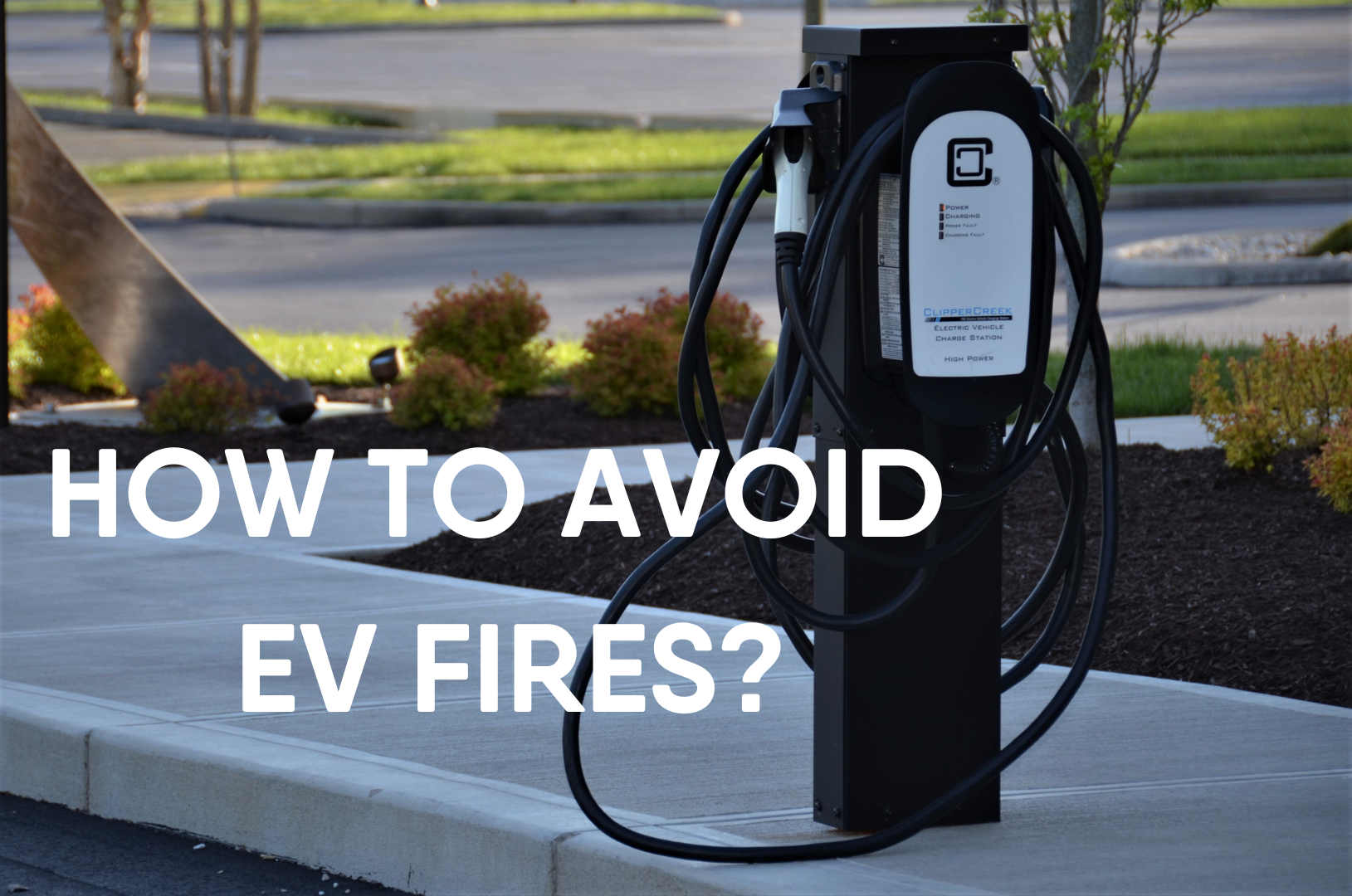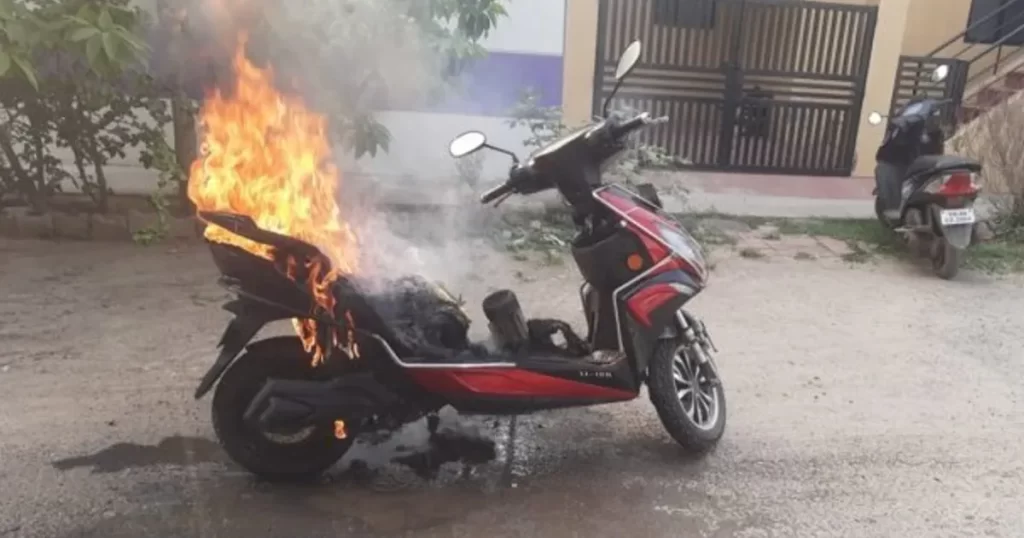Menu
Menu

Updated on Jul 10, 2023 | 4 min read
On the 19th of July, around 3 am, an unexpected incident shook the peaceful Panavoor Village in Thiruvananthapuram District, Kerela. An EV 2-Wheeler from a well-known brand unexpectedly caught fire in a house, causing quite a commotion. The concerned party promptly lodged an FIR at the Nedumangad Police Station, and an investigation is now underway.
Unfortunately, this isn’t the first time we’ve seen an EV fire. It seems like every year; we hear about another one. What’s even more frustrating is that companies are still selling EV’s without properly educating their customers on safety measures to prevent such incidents.
But let’s get serious here. EV fires are no laughing matter. They can cause significant damage and put lives at risk if immediate action isn’t taken. It’s a fact that nearly all Lithium-ion batteries have the potential to explode or catch fire under certain conditions.

Remember the Samsung Note 7 debacle in 2016? That infamous battery issue resulted in the phone being banned on flights. If a small battery in a phone can cause so much chaos, imagine the risk involved with larger EV batteries.
When thousands of cells release energy simultaneously, the rate of heat produced is mind-boggling. This phenomenon, known as Thermal Runaway, can lead to catastrophic consequences if not addressed promptly.
The truth is, we need to be aware of the potential risks and take precautions. Understanding how to handle EVs safely is crucial for all of us. As EV technology evolves, so should our knowledge about proper charging practices, maintenance, and safety measures.
Let’s not wait for another fiery incident to occur. It’s time to educate ourselves and others about EV safety and prevent unnecessary mishaps. Together, we can ensure a bright and responsible future for electric mobility.

1. Use of Certified Electric Vehicle Service Equipment (EVSE):
Always use charging equipment that meets the industry safety standards and is certified by reputable organizations like BIS Standards for Electric Charging. This ensures that the charging process is safe and reliable.
2. Avoid Recharging Battery Overnight:
Ensure that the Vehicle is being charged in the open and there is proper ventilation. Overnight charging sometimes led to thermal runaway as this can lead to overheating and potentially cause a fire.
3. Never use expired or rusty cables to Charge your vehicle.
Periodically inspect the charging cables for signs of wear and damage. Due to the nature of the EV charging station, the wires are continuously being exposed to the atmosphere and being used 24 hours. This wear and tear can sometimes lead to damage in wires thus causing high voltage current to leak.
4. Maintain Proper Charging Temperatures:
Avoid charging EVs in extremely hot environments, as high temperatures can affect battery performance and increase the risk of thermal runaway. Similarly, charging in excessively cold conditions can reduce battery efficiency.
5. Use Manufacturer-Recommended Charger
Follow the manufacturer’s guidelines for charging the EV. Adhere to the recommended charging rates, voltage, and current settings to prevent stress on the battery. The reason why Phone OEMs give chargers is that these bricks charge phones efficiently and effectively in the manner as it is recommended.
6. Avoid the Extreme States of Charge:
Refrain from letting the battery charge drop to extremely low levels or reach a 100% state of charge regularly. The Battery should be drained and recharged properly so that when it is being charged it happens effectively.
7. Never Attempt DIY Modifications:
No DIY modifications to your EV or charging equipment. Unapproved changes can jeopardize the safety and reliability of your charging system. Keep in mind that batteries are IPX rated, making them waterproof and dirtproof. If the tight seal breaks, water can enter and damage the battery, so be cautious and maintain the integrity of the packaging.
8. Monitor Charging Progress using CMS provided by your service provider:
Stay attentive while the EV is being charged, especially when using public charging stations. If you notice any irregularities or overheating during the charging process, stop charging immediately and seek assistance. If possible, move the battery away from the Charging station.
9. Implement Smart Charging Solutions:
Consider using smart charging solutions that offer features like scheduled charging, load balancing, and remote monitoring. These technologies help optimize charging and prevent potential hazards.
10. Educate EV Owners and Users:
Educate EV owners and users about safe charging practices, including the importance of following manufacturer guidelines and understanding the warning indicators on the vehicle.
11. Regular Maintenance and service of vehicles from Authorized dealerships:
Conduct regular maintenance checks on both the EV and charging infrastructure to identify any potential issues early on.
12. Emergency Preparedness or First Responder Guide:
Have a fire extinguisher nearby, if possible, ask your charging station service provider to arrange some amount of GRAPHITE or SAND specifically designed for electrical fires, as part of an emergency preparedness plan. Never use water as it is a good conductor of electricity.

By following these best practices, EV owners and charging station operators can mitigate the risk of EV fires and ensure a safe and smooth charging experience for all. Safety should always be a top priority when it comes to embracing the benefits of electric mobility.
Talk to our expert about EV Charging, kindly fill in the details below.

Content Writer
© 2024 Massive Mobility Private Limited. All rights Reserved